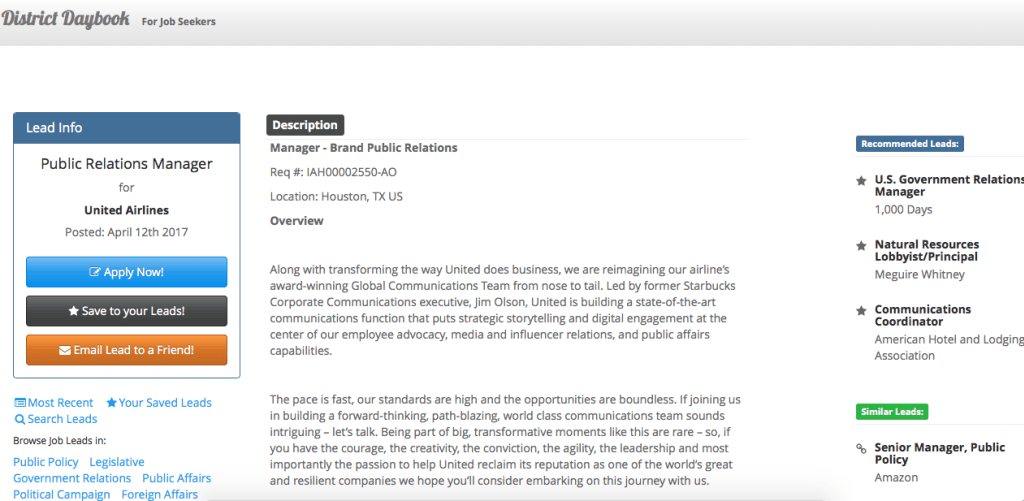
This is an issue that transcends partisan politics: The public relations industry is in desperate need of reformor creative disruption.
Case in point: United Airlines. Did you see how the airline handled itself after a passenger was forcibly removed from a flight in Chicago’s O’Hare Airport? The airline company has suffered massive blowback after this fiasco. Notwithstanding the passenger’s shady past, no passenger who has paid for a plane ticket should be treated this way.
Ironically enough, United’s CEO Oscar Munoz was listed as PRWeek’s Communicator of the Year in March 2017. Here’s how the publication honored him:
Munoz has shown himself to be a smart, dedicated, and excellent leader who understands the value of communications. His ability to connect and share with employees his vision for the airline, and get them to rally behind it, is a key reason PRWeek named him 2017 Communicator of the Year.
Following the incident, Munoz called the United passenger disruptive and belligerent. (Rule of thumb: Never EVER resort to victim-blaming for your company’s shortcomings. Scapegoating is a weak move.) Soon afterwards, he and the airline have profusely apologized yet embarrassed themselves in the process. And adding insult to injury, the company listed this PR job mere days within the incident:

Yikes. Is United asleep? Clearly, because the public is losing confidence in them.
Is this PR disaster symptomatic of an over-arching problem–perhaps the lack of adept and competent people to effectively manage and maintain brands? I’ll elaborate more on PR’s shortcomings shortly.
What is PR and how does it currently stand? The Public Relations Society of America defines it as the following:
“Public relations is a strategic communication process that builds mutually beneficial relationships between organizations and their publics.”
Public relations stretches from politics to corporate America and everything in between. Although I come from a largely political background, I’ve seen PR successes and disasters unfold before me. Since 2009, I’ve worked in some capacity of PR in radio, column writing, media startups, and press relations for various clients or companies. In fact, I’m considered self-taught without much formal experience in a PR shop. (You dont need to follow a strict path to work in media, friends.) Although I didnt formally dip my toes in the traditional PR pool, I’ve managed to forge my own path in it and recognize how to identify good, effective communicators.
One need not be a corporate executive to know if your public relations strategies will suck or will thrive.
Traditional public relations strategies will continue to thrive but compete with new innovations and new demands. Strategic communications via relationship-buildling and garnering publicity will still matter. However, the space in which PR will operate will change–as it already has. More companies are opting for in-house PR departments rather than outsourcing work to a firm. Why? It’s less costly, more intimate, and more responsive to company/client needs. Thanks to the advent of the gig economy and start-up culture, PR is changing for the better.
1. One doesnt need decades of experience or to follow traditional route to succeed in PR
Many job listings for PR have these lofty and oftentimes ridiculous requirements. 10-15 years of experience? Huh? Many companies make the mistake of placing limitations to their applicant pool by setting ridiculous expectations. What if someone has 3-5 years of proven experience and PR successes under their belt? What if they have a large personal brand that can add to the company brand? Shall they be penalized for that? NO. The new economy welcomes unconventional approaches to innovation, so younger and smarter PR people are inevitable and will soon dominate the industry as they should. Don’t be coaxed into believing you have to slave for a decade or two to make it in PR.
2. PR should be egalitarian, not elitist
Do you feel that PR shops are teemed with elitism? You’re not alone. PR, like many other sectors, is perceived to open to a few select peoplewith impenetrable walls placed deterring newbies or disruptors from climbing the ranks in the industry. I’ve seen both political and non-political comms shops fall into this trap–mostly to their detriment. These shops are laced with nepotism, old guard types, and hostile work environments resistant to digital or innovative change. How can you improve PR if tech-savvy, digital type, creative thinkers are eliminated from consideration? We need more effective communicators, not fewer.
3. Stop making PR convoluted and complicated
Isn’t the goal of PR to make messaging simpler and easier to understand? Why the lofty language, insane job requirements, or messaging inconsistencies? This field is not rocket science! Anyone can learn to navigate PR and equally excel in it. However, perpetuating the status quo will not help companies like United succeed going forward. Something’s got to change
There’s so much more to add on the subject of PR, but I’ll reserve that for future blog posts.
If you’re looking for someone to help you define, act on, and execute your message/PR campaign, shoot me an email. Id love to work with you.
###
As always, I recommend you follow me on Facebook, Twitter, and Instagram to stay in the loop with my musings. Subscribe to my newsletter–now LIVE. Chime in below with your comments! Am I off-mark or on-target? Let me know!
